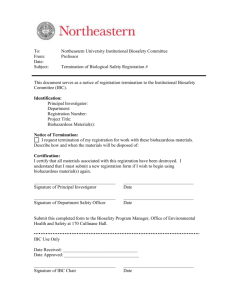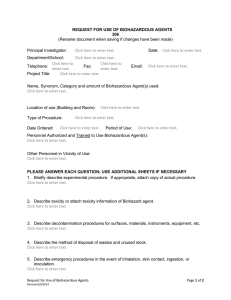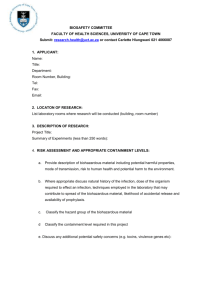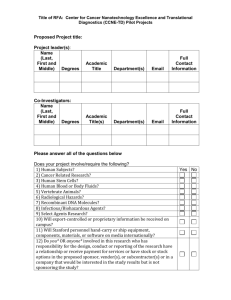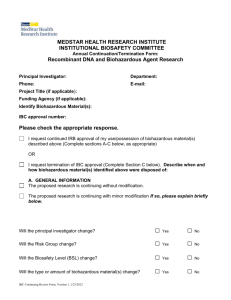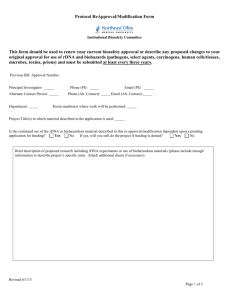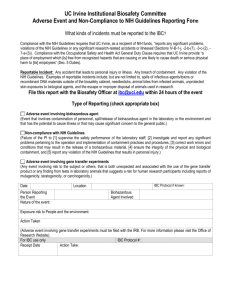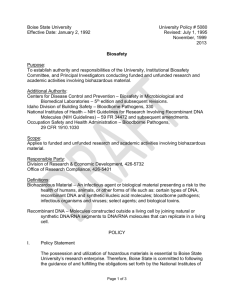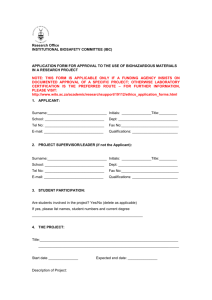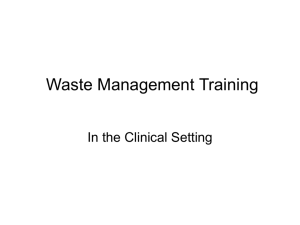IBC-17 - University of Nebraska Medical Center
advertisement
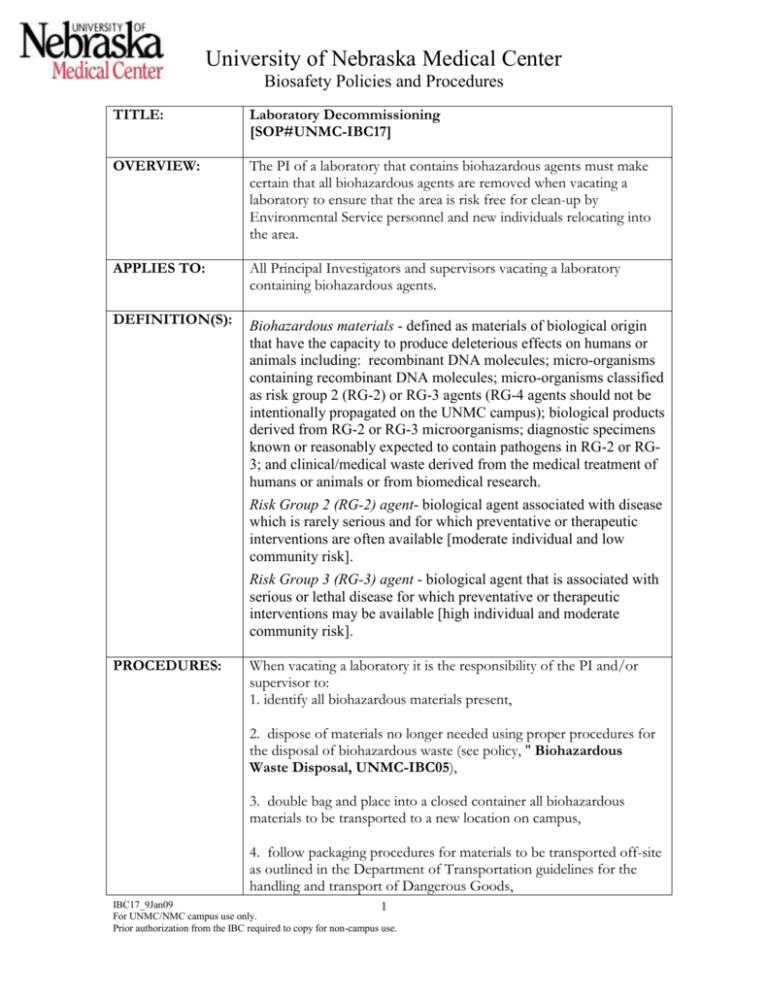
University of Nebraska Medical Center Biosafety Policies and Procedures TITLE: Laboratory Decommissioning [SOP#UNMC-IBC17] OVERVIEW: The PI of a laboratory that contains biohazardous agents must make certain that all biohazardous agents are removed when vacating a laboratory to ensure that the area is risk free for clean-up by Environmental Service personnel and new individuals relocating into the area. APPLIES TO: All Principal Investigators and supervisors vacating a laboratory containing biohazardous agents. DEFINITION(S): Biohazardous materials - defined as materials of biological origin that have the capacity to produce deleterious effects on humans or animals including: recombinant DNA molecules; micro-organisms containing recombinant DNA molecules; micro-organisms classified as risk group 2 (RG-2) or RG-3 agents (RG-4 agents should not be intentionally propagated on the UNMC campus); biological products derived from RG-2 or RG-3 microorganisms; diagnostic specimens known or reasonably expected to contain pathogens in RG-2 or RG3; and clinical/medical waste derived from the medical treatment of humans or animals or from biomedical research. Risk Group 2 (RG-2) agent- biological agent associated with disease which is rarely serious and for which preventative or therapeutic interventions are often available [moderate individual and low community risk]. Risk Group 3 (RG-3) agent - biological agent that is associated with serious or lethal disease for which preventative or therapeutic interventions may be available [high individual and moderate community risk]. PROCEDURES: When vacating a laboratory it is the responsibility of the PI and/or supervisor to: 1. identify all biohazardous materials present, 2. dispose of materials no longer needed using proper procedures for the disposal of biohazardous waste (see policy, " Biohazardous Waste Disposal, UNMC-IBC05), 3. double bag and place into a closed container all biohazardous materials to be transported to a new location on campus, 4. follow packaging procedures for materials to be transported off-site as outlined in the Department of Transportation guidelines for the handling and transport of Dangerous Goods, IBC17_9Jan09 1 For UNMC/NMC campus use only. Prior authorization from the IBC required to copy for non-campus use. University of Nebraska Medical Center Biosafety Policies and Procedures 5. thoroughly decontaminate, using an appropriate disinfectant (10% bleach is generally used except in places where other disinfectants have been recognized as more effective) all areas that contained biohazardous materials, 6. surface disinfect all equipment, whether transported or not. The biohazard label on equipment (such as refrigerators or incubators) left in the laboratory should be removed after decontamination, 7. check for materials belonging to the PI in all common use refrigerators and freezers and have these materials removed or if maintained, properly labeled with the PIs name, date of storage, and biohazardous agent(s) present, 8. have door signage removed by calling the Director of the Office of Safety, and 9. contact the Institutional Biosafety Committee prior to the relocation or termination of experiments to update the IBC protocol. Special procedure for BSL-3 and ABSL-3 laboratories: Prior to decommissioning of a high containment laboratory, the room must be decontaminated by fumigation (see policy, "Paraformaldehyde Room and Biological Safety Cabinet Decontamination, UNMC-IBC14"). RECORD KEEPING: OTHER INFORMATION: Not applicable. It is the responsibility of the Primary Investigator to ensure that all biohazardous materials are removed prior to vacating a laboratory. Failure to comply with this policy may lead to a revocation of the IBC protocol until such time as corrective action is completed. Investigators relocating off-campus or leaving the University who plan to transport biohazardous materials must comply with all DOT, Public Health Service, and USDA requirements for the transport of infectious materials. REFERENCES: CDC/NIH Biosafety in Microbiological and Biomedical Laboratories, 5th Edition, 2007 STATUS: Drafted: Approved by IBC: Revised: April 29, 2005 May 13, 2005 January 9, 2009 IBC17_9Jan09 2 For UNMC/NMC campus use only. Prior authorization from the IBC required to copy for non-campus use.
